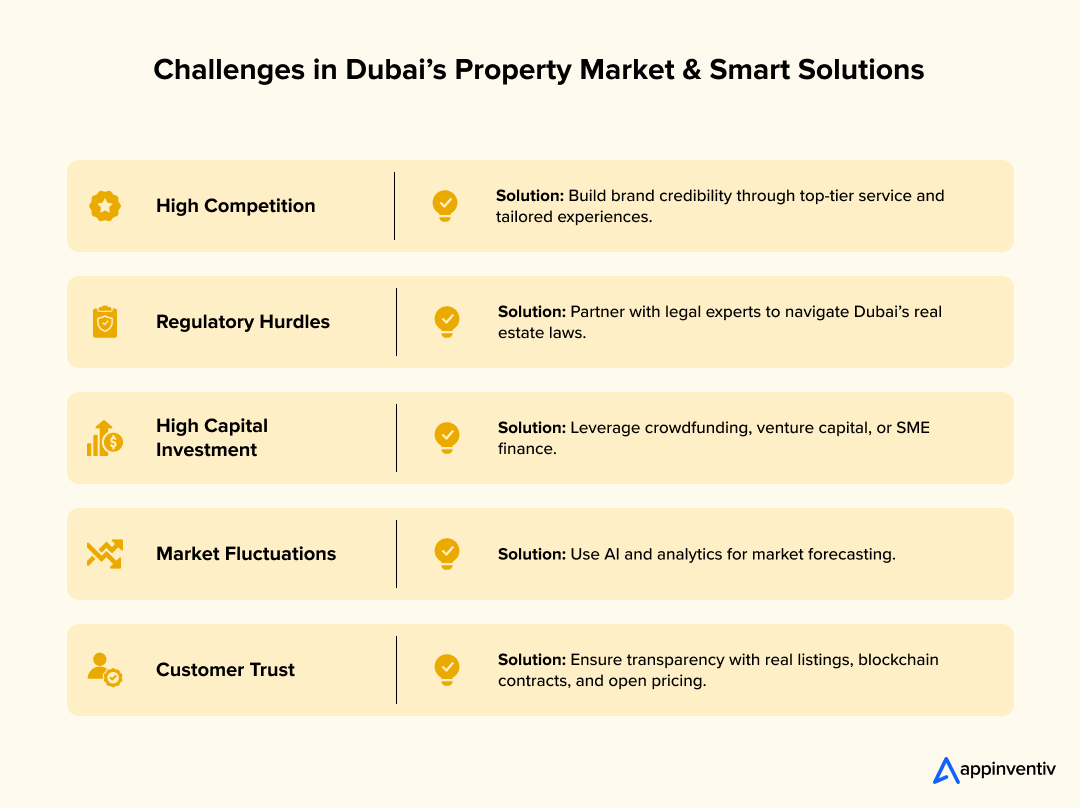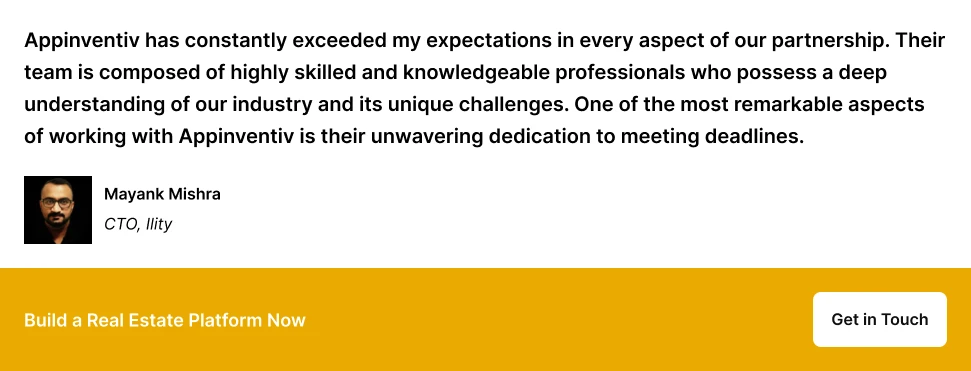- 15 Real Estate Business Ideas for Startups in Dubai
- AI-Powered Online Auction Platforms
- Online Rental Business
- Sustainable & Eco-Friendly Building Projects
- Ultra-Luxury Short-Term Rental Business
- Blockchain-Powered Real Estate Crowdfunding Platform
- Premium Brokerage Services for High-Net-Worth Individuals
- Virtual Property Tours Using VR & AR
- Verified Premium Property Listing Platform
- Property Management Software & Services
- Property Inspection & Compliance Services
- Commercial Space Conversion & Optimization
- Legal Advisory & Transaction Support
- AI-Powered Investment Analytics & Market Intelligence Platform
- Metaverse Real Estate Development & Consulting Services
- Challenges & Risks in Dubai’s Real Estate Market
- High Competition
- Regulatory Hurdles & Licensing Requirements
- High Capital Investment & Initial Costs
- Market Fluctuations & Economic Factors
- Customer Trust & Brand Credibility
- How to Start a business related to real estate in Dubai?
- Best Future Business Ideas for Real Estate in Dubai: Emerging Trends
- Metaverse Real Estate Investments
- Sustainable Urban Planning & Smart Cities
- Blockchain & Tokenized Real Estate
- Growth of Co-Living & Flexible Spaces
- Expand Your Real Estate Business Ideas in Dubai, UAE with Appinventiv
- FAQs
- Q. How do you start a business related to real estate in Dubai?
- Q. What are the main funding sources for real estate startups?
- Q. How is the crypto exchange integration with real estate platforms in the UAE transforming Dubai's property market?
- Q. What are the advantages of smart home integration services to real estate companies?
- Q. What are the latest Dubai real estate market trends in 2025?
- Q. What are the main challenges of setting up a real estate crowdfunding platform in Dubai?
- Q. How is the demand for property management software in Dubai?
- Q. What advantages does AI bring to real estate companies in Dubai?
- Q. How does blockchain benefit real estate transactions in the UAE?
- Q. Is the Dubai real estate market still growing, or is it slowing down?
- Q. How can mobile apps assist real estate businesses in scaling up in Dubai?
- Q. What government support is available for real estate startups?
Key takeaways:
- Dubai’s real estate market is booming, with $36.32 billion in 2024, and a projected value of $52.32 billion by 2030.
- Real estate tech startup ideas in Dubai, like AI analytics, blockchain-based tokenization, and metaverse initiatives, are reshaping the industry.
- Eco-friendly developments and smart city initiatives are the fundamental pillars, creating opportunities for green building and energy solutions.
- Fractional ownership is rising, driven by blockchain and crypto exchange integration with real estate platforms in the UAE.
- The rise of co-living and flexible workspaces reflects a shift towards adaptable and community-focused living arrangements, catering to a dynamic, mobile population.
From luxury skyscrapers that touch the clouds to AI-driven property deals sealed in seconds, Dubai’s real estate scene is thriving by leaps and bounds. The city has become a playground for innovation and bold ideas. They are doing everything from AI-powered property tours to closing deals with blockchain in minutes. It’s truly changing every inch of space – how you buy a home, how you sell it, and even how buildings ‘think’ and adapt around us.
This explosive growth is not coincidental. Dubai’s ambitious Economic Agenda D33 fuels it. D33 aims to double the city’s economy by 2033, making it one of the top three global cities for living, investing, and working.
Still unsure what makes Dubai’s real estate sector irresistible? Let’s look at some head-turning facts and figures because numbers don’t lie.
- In the first half of 2025 alone, Dubai witnessed 94,000 residential sales transactions—a remarkable 23.04% year-on-year increase.
- Fuelled by $200 million+ in startup funding in just the first half of 2024 and anchored by government initiatives like Dubai Economic Agenda (D33), the ecosystem is ripe for disruption. Whether it’s rental yields averaging 7% or property values projected to climb 5–8% annually, opportunity here is not just knocking, it’s pounding on the door.
- The UAE Residential Real Estate Market, valued at $36.32 billion in 2024, is projected to reach $52.32 billion by 2030.
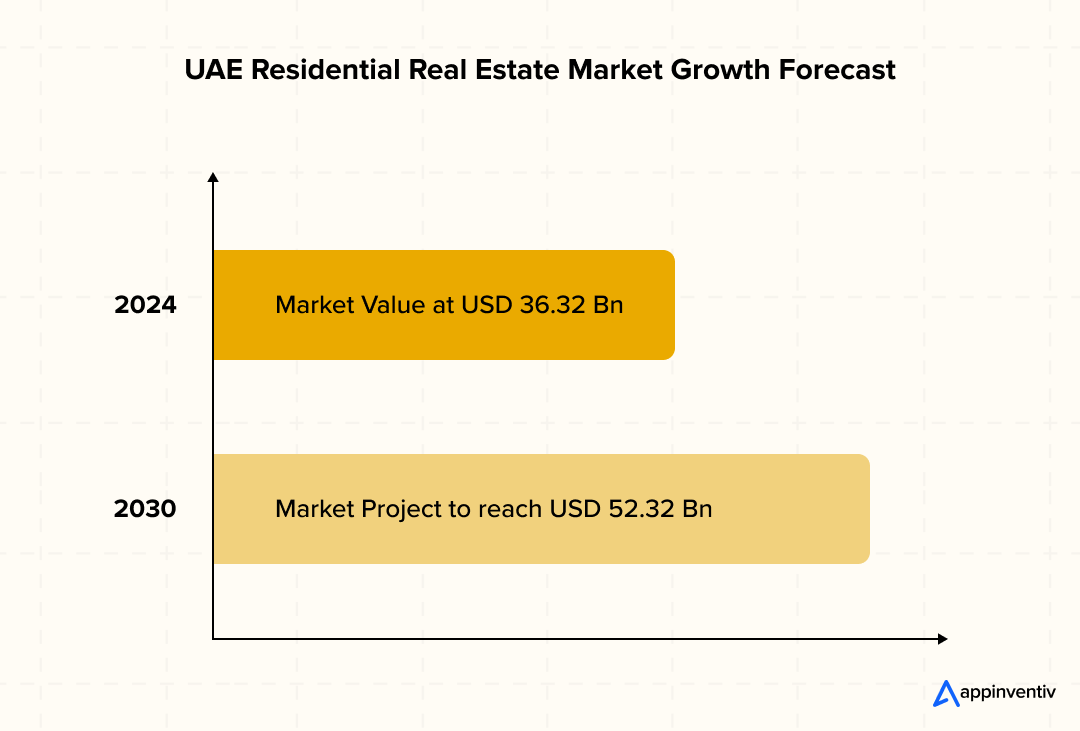
- In 2024, Dubai saw AED 761 billion worth of property deals. This aligns perfectly with the bold Dubai Economic Agenda D33. The goal here is to rank Dubai among the top three city economies, which aims to rank Dubai among. (Dubai.ae)
- MENA startups raised $863 million in January 2025 alone, with $14.6 million allocated by venture capital firms in Dubai.
These numbers speak volumes about how Dubai offers unparalleled business opportunities in real estate. For startups eyeing this goldmine, the timing couldn’t be better to step into the real estate sector and seize the opportunities. Here are some innovative real estate business ideas for startups in Dubai that could help you ride this wave and maybe even reshape the skyline.
15 Real Estate Business Ideas for Startups in Dubai
Dubai’s real estate ecosystem is ripe for disruption. The convergence of government support, technological advancement, and massive capital flows creates the perfect storm for innovative ideas for business related to real estate in Dubai. Market-savvy startups that use the latest technologies can reap the opportunities and cater to international investors and residents.
Here are the 15 best real estate business ideas for startups in Dubai. Let me cut through the noise and clear it from the very start that nearly every real estate business idea is incomplete without the integration of mobile app technology. We will discuss the importance of mobile applications in the real estate business ideas in 2025, section by section, in the segment below.
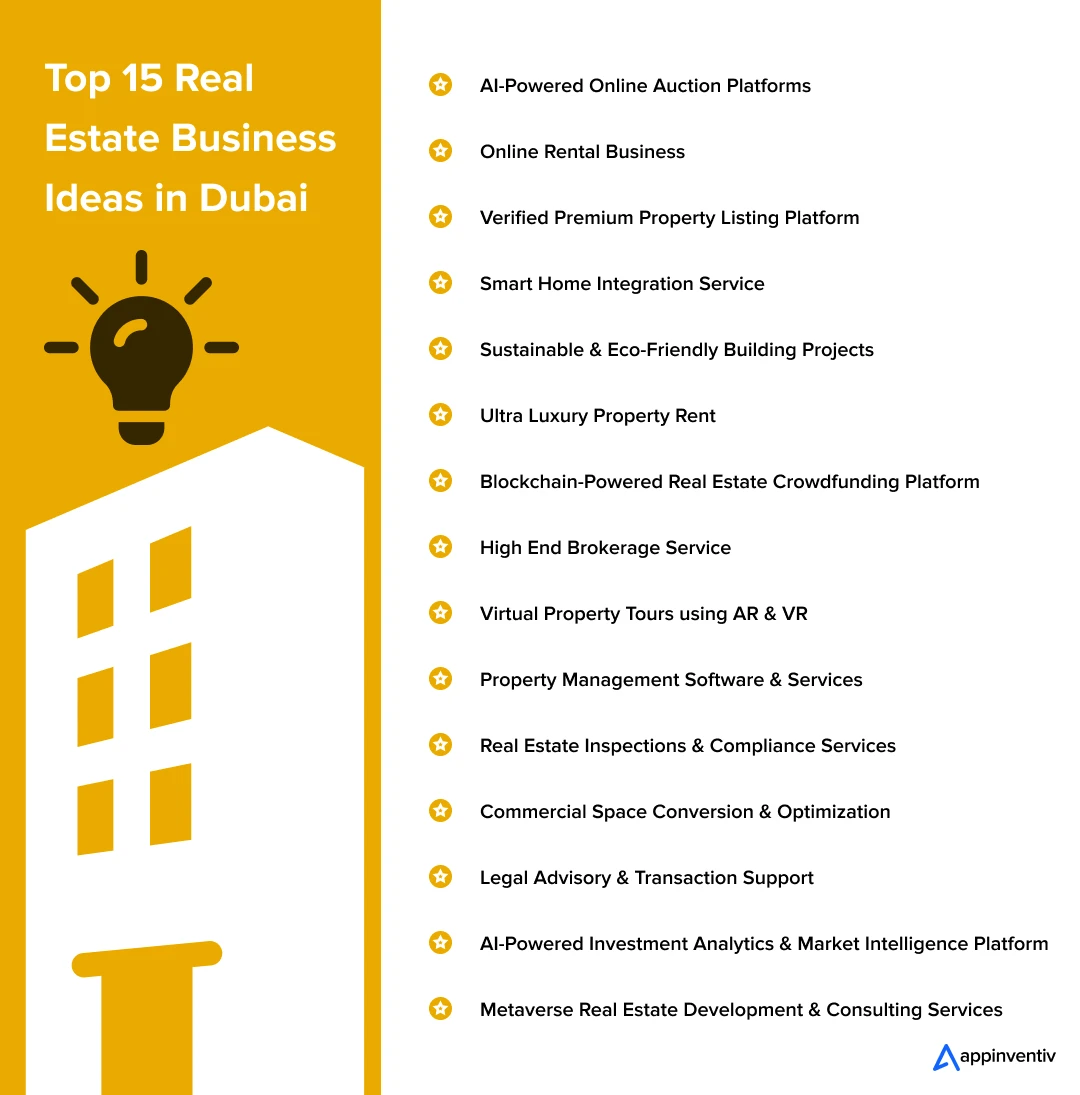 Smart Home Integration Services
Smart Home Integration Services
Imagine a home where lights dim as you whisper, “Evening,” and your AC knows it’s time to cool down before you step inside. The future of real estate in Dubai is all about smart living. With Dubai’s vision of becoming a fully connected smart city, startups can offer end-to-end smart home solutions—from consultation to installation and maintenance.
How Mobile Apps Help:
With Dubai’s growing interest in smart living and its tech-savvy population, building a smart home automation app is quickly becoming a standard expectation. A smart home app can be central to service delivery and user experience. This idea provides clear value to homeowners and developers looking to differentiate their properties.
Results:
- Homeowners get increased comfort, energy savings, and better security.
- Startups can market their properties as “smart-ready,” increasing their appeal to modern buyers.
- This is a scalable model for startups with strong recurring revenue potential, especially with subscription-based support plans, upgrades, and integrations with new devices.
AI-Powered Online Auction Platforms
Traditional property auctions in Dubai are often slow, manual, and limited to small buyer circles. An intelligent online auction platform can transform this by offering transparent, accessible, and fast property transactions that cater to Dubai’s digital-savvy market.
An AI-driven auction platform needs to go beyond just hosting listings. It should include proper verification of property documents, seller identity checks, and integration with government systems like the Dubai Land Department for real-time validation.
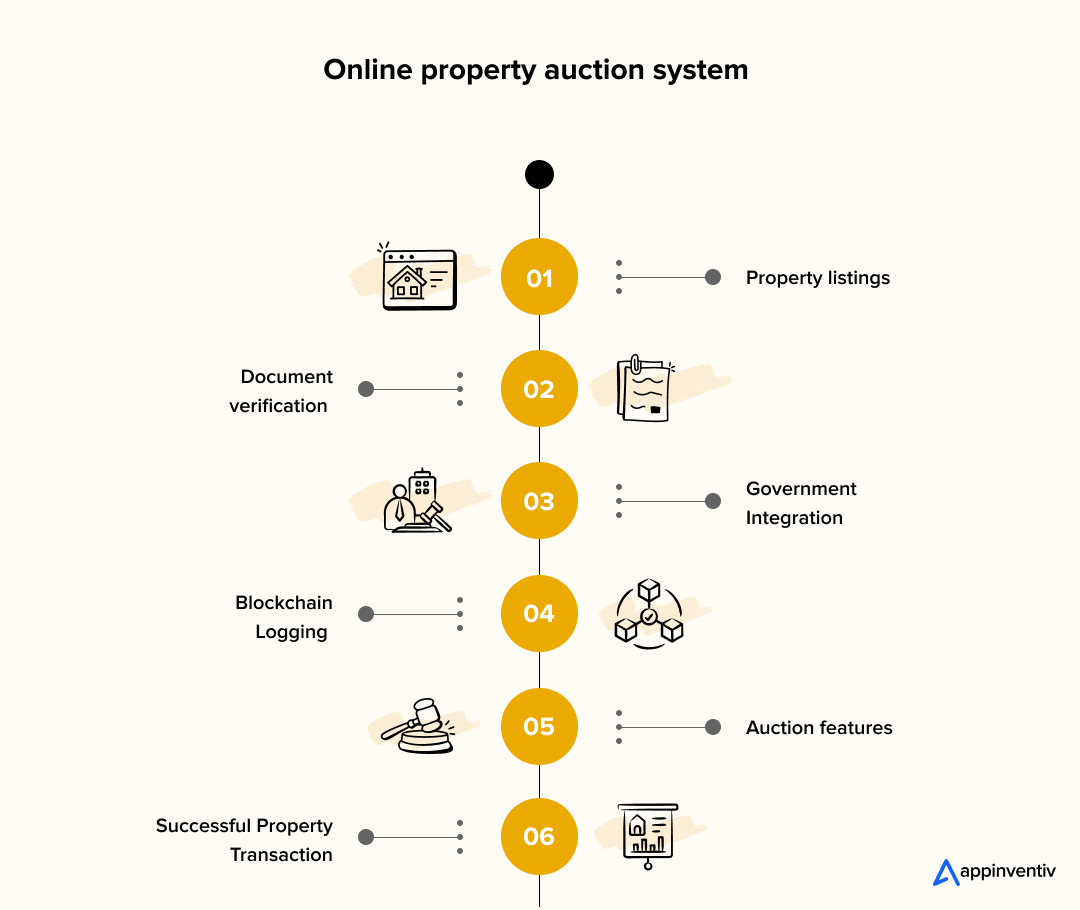
How Mobile Apps Help:
A mobile app makes the platform easier to use, especially for users who want to track auctions in real-time. It allows buyers to place bids from anywhere, receive notifications about new properties, or get alerts when they’re outbid.
Results:
- Real-time bidding with push notifications
- AI-powered property valuation using machine learning algorithms
- Blockchain-based smart contracts for transparent, secure transactions
Online Rental Business
Managing rental properties in Dubai can be time-consuming for both landlords and tenants. Most of the process still happens manually or via spreadsheets, from rent agreements and maintenance requests to payment tracking and renewals. This leaves room for confusion, delays, errors, and poor tenant experiences.
A forward-thinking startup can solve this by building an end-to-end online rental platform that handles everything from AI-powered tenant screening to digital lease signing and automated rent collection. This would focus specifically on rentals, offering a seamless experience for long-term tenants, serviced apartments, and corporate leases.
How Mobile Apps Help:
A dedicated rental business app is the central hub for tenants and property owners. Tenants can use it to search available properties, submit documents, and sign their lease digitally. Once they move in, the app becomes their go-to space to pay rent, raise maintenance tickets, and receive important notices from landlords or building management. For landlords, the app offers real-time updates on tenant status, pending payments, lease expirations, and performance metrics.
Results:
- Automated system for payment collection and submissions.
- Integrated payment systems with cryptocurrency support
- Predictive maintenance using IoT sensors
- Virtual property tours using VR/AR technology
Sustainable & Eco-Friendly Building Projects
Dubai’s sun-soaked climate isn’t just for tanning—it’s a call for sustainable real estate development in the UAE property market. The city’s 2030 sustainability goals push for net-zero buildings, creating a niche for startups offering eco-friendly design and retrofitting. Startups can apply Dubai’s Green Building Regulations, offering services like solar panel integration, greywater recycling, and energy-efficient cooling systems tailored to the UAE’s climate.
How Mobile Apps Help:
A mobile app could let users track compliance and carbon footprints, tapping into Dubai’s green building market. Also, the app helps manage contractors, monitor project milestones, and generate sustainability reports or certification documentation.
Results:
- Eco-friendly construction offers both economic and marketing benefits.
- Property owners enjoy reduced utility bills, better indoor air quality, and long-term asset value.
- For startups, this model aligns with Dubai’s regulatory direction and opens up various revenue streams.
Ultra-Luxury Short-Term Rental Business
Dubai attracts high-net-worth tourists, business travelers, and digital nomads who prefer luxury and privacy over hotel stays. This demand has created a profitable niche for short-term luxury property rentals like penthouses in Downtown, waterfront villas on Palm Jumeirah, or high-end serviced apartments in DIFC.
However, most platforms today either focus on budget accommodations or lack the level of service that luxury tenants expect. Startups have a clear opportunity to create a specialized rental business focused only on high-end, short-term stays. Everything from cleaning to check-in and personalized amenities should match the quality of the property being rented.
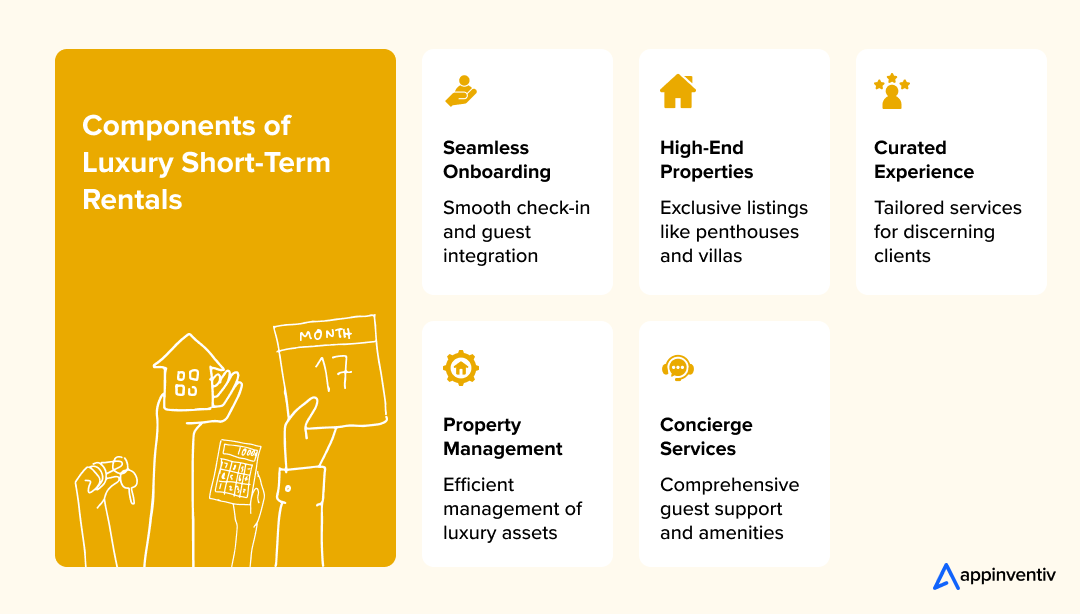
How Mobile Apps Help:
A dedicated mobile app with VR tours and real-time market insights can serve both guests and property owners. For guests, the app can showcase properties with rich media—video walkthroughs, 3D tours, and verified guest reviews. Furthermore, the app becomes a dashboard for property owners to track occupancy, earnings, guest feedback, and schedule services like cleaning or restocking.
Results:
- Focusing on the premium short-term rental space can lead to higher margins, more loyal clientele, and repeat business from corporate travel managers or event organizers.
- A niche service can offer greater control over the guest experience and build a strong reputation in a high-trust segment.
- Property owners benefit from higher occupancy and professional management without having to list on multiple platforms.
Blockchain-Powered Real Estate Crowdfunding Platform
Owning a piece of Dubai’s skyline shouldn’t be a billionaire’s privilege. Many small investors are eager to invest, especially in high-growth areas or commercial real estate, if the entry point is lower and the process is simpler. This creates a strong case for real estate crowdfunding or fractional investment platforms that allow individuals to invest in property collectively. Fractional investment platforms let everyday investors buy shares in properties.
A crowdfunding platform that allows investors to purchase fractional ownership in Dubai properties starting from as little as AED 2,000 ($540).
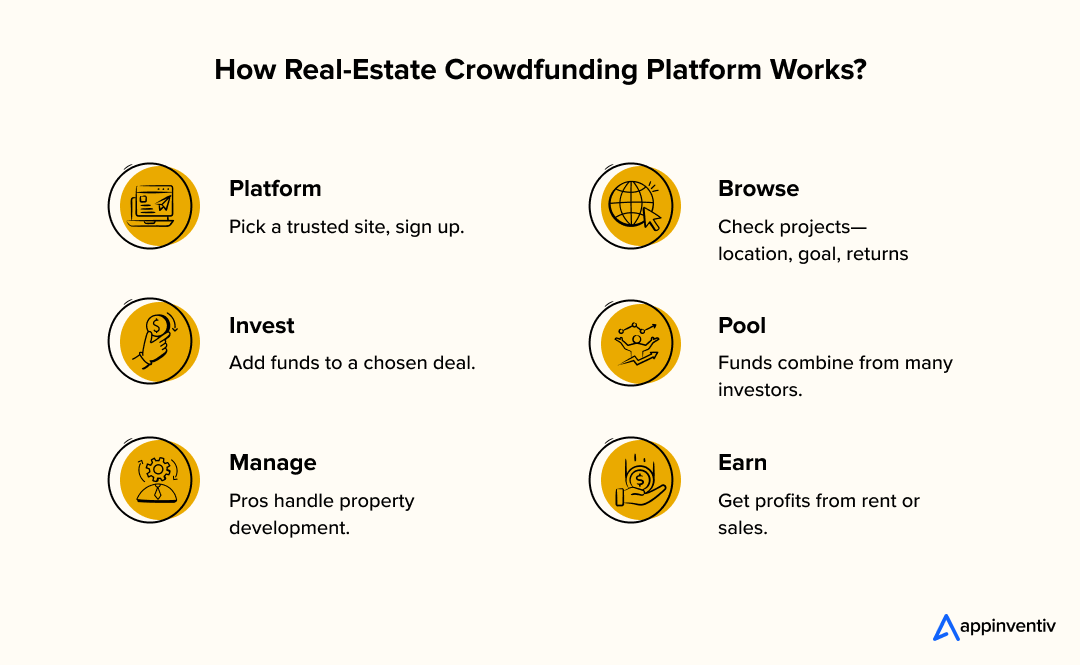
How Mobile Apps Help:
Building a real estate crowdfunding platform would be the primary tool for users to browse available investment opportunities, review due diligence documents, and track their portfolio performance in real time. Before committing funds, users can view key data like projected rental yields, occupancy rates, location metrics, and developer history.
Results:
- It regularly updates photos, financials, and progress reports for ongoing or off-plan projects.
- Smart contracts for automated dividend distributions
- Real-time portfolio tracking and performance analytics.
- Secure wallet integration for seamless transactions.
Premium Brokerage Services for High-Net-Worth Individuals
While Dubai has numerous real estate brokers, few focus exclusively on the ultra-luxury segment. Many agencies operate at volume, handling everything from studio apartments to bulk off-plan sales. This one-size-fits-all model often overlooks high-net-worth individuals (HNWIs) who seek discretion, in-depth market insights, and personalized attention.
As a startup, you can provide a high-end brokerage service to address this gap by focusing exclusively on premium properties, like waterfront penthouses, branded residences, golf villas, and trophy assets.
How Mobile Apps Help:
A mobile app for this kind of brokerage wouldn’t be like a traditional property search app. Instead, it would function more like a private client portal. This model focuses on quality over quantity.
Verified users can view exclusive off-market listings, schedule private viewings, and access curated investment opportunities based on their profile. The app can feature detailed market reports, legal guides, and secure communication channels for real-time discussions with personal advisors. For clients with active portfolios, the app can display performance dashboards, rental income tracking, or updates on ongoing construction for off-plan investments.
Results:
- Exclusive access to off-market luxury properties
- Concierge services for international clients
- Comprehensive market intelligence and investment analytics
Virtual Property Tours Using VR & AR
In Dubai’s real estate market, buyers often make high-value decisions remotely, especially international investors and expats planning relocations. Relying on static photos or basic video tours doesn’t provide enough clarity or confidence. This creates a clear opportunity for a startup to offer immersive virtual property tours using AR (Augmented Reality) and VR (Virtual Reality) technology.
AR/VR innovations in Dubai are revolutionizing the industry by enhancing core operations and customer experience. It helps developers showcase off-plan properties long before construction, while sellers can attract serious buyers without scheduling multiple physical visits. With accurate 3D models, spatial walkthroughs, and realistic staging, virtual tours can help reduce time on market, improve lead quality, and eliminate repetitive, time-consuming showings.
How Mobile Apps Help:
An AR/VR-based construction platform can host these virtual tours and make them easily accessible on both phones and tablets. For VR, users can experience fully immersive walkthroughs with a headset, while AR features can allow them to overlay property models onto real-world spaces through their phone camera.
Results:
- Photorealistic 3D property models for off-plan developments
- AR-powered furniture and layout visualization
- VR showrooms for international investors
- Interactive property customization tools
Verified Premium Property Listing Platform
Most property listing websites in Dubai focus on showing as many listings as possible to as many people as possible. This often leads to outdated information, duplicate entries, and limited value for serious buyers. While existing platforms focus on volume, startups have a clear opportunity to build a curated, verification-focused platform that serves serious buyers and investors.
These property listing platforms verify the context with clear documentation, updated availability, and transparent pricing. Verified agent accounts, a rating system, and buyer inquiry tracking can help improve trust and filter out low-quality listings.
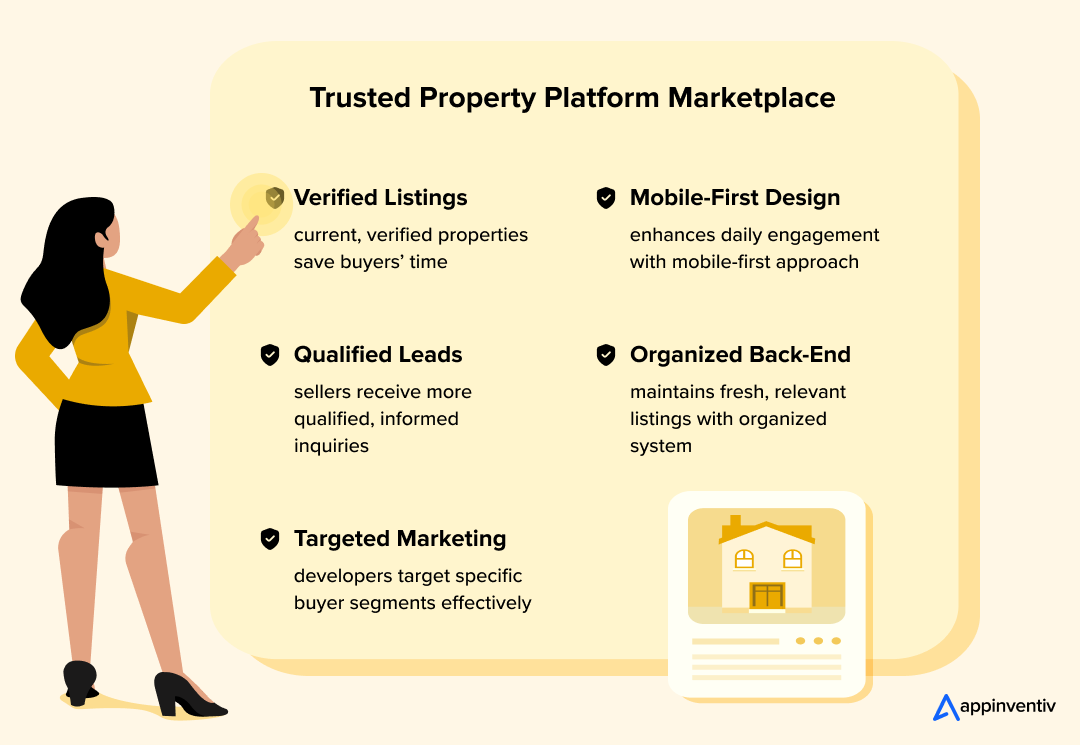
How Mobile Apps Help:
With a clean interface and fast search filters, users can sort listings by features like “ready-to-move-in,” “fully furnished,” “sea view,” or “installment plans.” The app can also include GPS-based recommendations, which notify users of nearby listings as they travel through different neighborhoods.
Results:
- Users trust and return to it, not because it has the most listings, but because it has the most reliable ones.
- Buyers save time by browsing only current and verified properties.
- Sellers and agents benefit from more qualified leads instead of wasting time on casual or misinformed inquiries.
Also Read: The ultimate guide to propertyfinder app development cost
Property Management Software & Services
Many property owners in Dubai face challenges in managing their units. From rent collection and maintenance requests to renewals and compliance, property management feels a real pain when done manually. This opens up a door of opportunities for a startup to build property and lease management software that combines automation with real human support.
How Mobile Apps Help
A Property Management Service-based app or software acts as the command center for both landlords and tenants. Landlords can log in to track rent payments, view lease terms, monitor occupancy, and receive alerts for contract renewals or maintenance issues. On the tenant’s side, the app simplifies rent payment, access to lease documents, maintenance requests, and communication with the landlord or property manager.
Results:
- Automated rent collection and financial reporting
- Predictive maintenance using IoT sensors
- Tenant communication portal
- Real-time performance dashboards for property owners
Property Inspection & Compliance Services
Independent property inspections are becoming more important than ever in Dubai’s fast-moving property market, especially with off-plan and new construction units. Many local and international buyers receive handovers without knowing whether the property is fully compliant, defect-free, or built to promised specifications. A startup focused on professional real estate inspections can offer pre-purchase inspections, handover snagging reports, compliance checks, and quality assessments for residential and commercial properties.
This business idea is especially valuable for first-time buyers, investors purchasing remotely, or landlords preparing a property for new tenants. The goal is to identify issues early, before they become legal or financial problems.
How Mobile Apps Help:
A mobile app can simplify inspection booking, progress tracking, and report delivery. Clients can schedule an inspection, track the inspector’s arrival, and receive a digital report with photos, comments, and suggested actions. Reports can be stored within the app for future reference or shared with lawyers, contractors, or developers.
Over time, clients can use the app to schedule re-inspections or monitor issue resolution status. Add-ons like video walkthroughs, thermal imaging summaries, or live virtual inspections for overseas clients can make the service even more valuable.
Results:
- Pre-purchase inspections with detailed digital reports
- Handover snagging reports for new constructions
- Compliance checks for rental properties
- Thermal imaging and structural assessments
Commercial Space Conversion & Optimization
Post-pandemic shifts and the rise of hybrid work have left many commercial spaces in Dubai, especially in business districts like Al Quoz, Barsha, and parts of Business Bay, underutilized or vacant. At the same time, there is a growing demand for unique spaces, such as boutique retail outlets, co-working hubs, wellness studios, and short-term pop-up venues.
This presents a significant opportunity for a business specializing in commercial space conversions—repurposing traditional office or retail units into functional spaces that cater to diverse needs.
The commercial space conversion startup could offer full-stack services: feasibility assessments, interior redesign, fit-out coordination, and even help with licensing and leasing. You are not just changing a space but giving it a new business model and life.
How Mobile Apps Help:
A mobile app can simplify planning, communication, and progress tracking throughout the conversion process. Property owners can use the app to submit a space for assessment, browse concept packages (like “wellness studio conversion” or “micro-retail layout”), and receive budget estimates. The app can show visual mockups, before-and-after examples, material options, and contractor availability.
Results:
- Feasibility assessments and ROI projections
- Interior redesign optimized for new use cases
- Licensing and compliance assistance
- Tenant matching and leasing support
Legal Advisory & Transaction Support
Real estate transactions in Dubai can involve complex paperwork, regulatory compliance, cross-border fund transfers, and evolving rules, especially for foreign investors or first-time buyers. While large firms may have in-house legal teams, most individual buyers, landlords, and small developers are left navigating contracts, approvals, and risks with little guidance.
This opens up a solid business opportunity for a legal advisory and transaction support service focusing on real estate.
How Mobile Apps Help:
A mobile app can simplify access to legal services and make real estate transactions more organized. Clients can use the app to securely submit documents, schedule consultations, and receive updates on their case or transaction progress. The app could feature a built-in document vault, automated reminders for contract renewals or registration deadlines, and a library of legal templates customized for different scenarios.
For foreign investors, the app can include multilingual support and step-by-step guides on the legal process of buying property in Dubai.
Results:
- Clients gain confidence, clarity, and protection during real estate transactions.
- Buyers avoid hidden liabilities, sellers close deals faster, and landlords can enforce clear, legally sound lease agreements.
- Transaction documentation and compliance checks
- Regulatory update notifications and consulting
AI-Powered Investment Analytics & Market Intelligence Platform
Dubai’s real estate market is becoming increasingly sophisticated and data-driven, yet most investors still rely on outdated spreadsheets and basic market reports to make million-dollar decisions.
Traditional market analysis often lacks real-time data integration, predictive modeling, and comprehensive risk assessment. This creates a clear opportunity for a startup to develop an AI-powered platform that transforms raw market data into actionable investment insights. The platform would aggregate data from multiple sources—DLD transactions, rental listings, demographic trends, and economic indicators—to provide investors with unprecedented market intelligence.
How Mobile Apps Help:
An AI-driven real estate mobile app serves as the command center for real estate investment decisions. Investors can access real-time market analytics, receive AI-generated investment recommendations, and monitor portfolio performance from anywhere. The app would feature predictive pricing models using machine learning algorithms that analyze historical data, current market conditions, and future development plans to forecast property values with remarkable accuracy.
Results:
- Predictive accuracy for short-term price movements using advanced algorithms
- Risk mitigation through comprehensive market analysis and early warning systems
- Portfolio performance optimization leading to better returns compared to traditional methods.
Metaverse Real Estate Development & Consulting Services
Dubai has embraced Web3 technologies with the Metaverse in real estate, aiming to make the emirate a leading Metaverse business hub and create 40,000 virtual jobs by 2030. However, most traditional real estate firms lack the technical expertise and understanding to enter this space effectively.
This ambitious vision creates unprecedented opportunities for startups to bridge traditional real estate with virtual property development. Startups can offer consulting services that help established developers transition into virtual real estate, building new revenue streams in the process.
How Mobile Apps Help:
A Metaverse real estate app would function as a virtual property showcase and transaction platform. Users can explore virtual developments, attend digital property tours, and even purchase virtual land parcels directly through the app. The platform would integrate with popular Metaverse environments while providing traditional real estate firms with the tools to create and manage virtual properties.
Results:
- 24/7 property showcasing capability through immersive virtual experiences
- Enhanced brand positioning as a technology-forward, innovative real estate company
- Virtual property development using blockchain-based ownership systems
- Digital twin creation for existing properties in virtual environments
Challenges & Risks in Dubai’s Real Estate Market
The real estate sector in Dubai presents enormous opportunities, but for startups entering this competitive sector, the journey can’t be a smooth road. It is full of barriers and challenges. From tough regulations to heavy capital needs, success is achievable only to those who can overcome these obstacles.
High Competition
The Dubai property market is populated by seasoned developers, brokers, and property management firms. Large conglomerates dominate the market, making it hard for new entrants to create a niche.
Solution:
- To stand out, find a niche within a niche market, such as green homes, smart homes, or PropTech solutions.
- Create a solid brand presence through enhanced customer service, tailored experiences, and innovative technology.
- Form strategic alliances with renowned companies, luxury brands, or tour operators to establish credibility.
Regulatory Hurdles & Licensing Requirements
The real estate sector in Dubai is regulated by strict laws under the Dubai Land Department (DLD), Real Estate Regulatory Agency (RERA), and Free Zone authorities. Startups must navigate complex licensing, ownership rules, and compliance policies.
Solution:
- Collaborate with local legal consultants to fully comply with Dubai property laws, foreign ownership rules, and investment regulations.
- Depending on business objectives and legal advantages, select the appropriate business structure (e.g., free zone company vs. mainland company).
- Stay updated on DLD and RERA policies to avoid fines, delays, or business disruptions.
High Capital Investment & Initial Costs
Real estate ventures require plenty of capital to rent office space, buy property, advertise, and pay operational costs. Acquiring funds could be difficult for young companies.
Solution:
- Explore alternative sources of finance, such as real estate crowdfunding, venture capital, or government-backed SME finance schemes.
- Start with a low-capital venture, such as a real estate advisory, online brokerage, or PropTech startup, before scaling up to high-capital ventures.
- Utilize the free zones of Dubai for affordable business registration, tax advantages, and streamlined regulations.
Market Fluctuations & Economic Factors
The Dubai property market is cyclical, with bursts of high growth followed by slowdowns due to world economic fluctuations, oil price movements, and changes in demand.
Solution:
- Diversify products to cover both luxury and mid-market segments to reduce risk.
- Invest in data-driven decision-making by foretelling trends using market analytics, AI forecasting technology, and real estate websites.
- Be agile by using flexible pricing, leasing options, and alternative revenue streams like property management or fractional ownership services.
Customer Trust & Brand Credibility
As property scams and false listings increase, customer trust is vital, especially for new entrants.
Solution:
- Build credibility through open pricing, authentic property listings, and a robust online presence.
- Utilize blockchain-based smart contracts to enhance transactional transparency.
- Leverage customer testimonials, influencer collaborations, and focused PR campaigns to build a reputable image.
By being ahead of the game in addressing these challenges with innovative solutions, startups can successfully maneuver the Dubai real estate landscape and capitalize on long-term prospects.
How to Start a business related to real estate in Dubai?
Starting a business related to real estate in Dubai is straightforward but requires precision. Here is a step-by-step guide on how to start a real estate business in Dubai
- Craft a Business Plan: Define your strategy, financial projections, and operational model.
- Pick a Niche: Pick from innovative business ideas for real estate like fractional ownership or sustainable retrofitting.
- Choose Business Structure: Decide whether you’ll set up in a mainland location or a free zone. Consider benefits like ownership and market access here.
- Pass RERA Exam: Complete the mandatory Real Estate Regulatory Agency (RERA) examination.
- Get Licensed: Register with the Dubai Land Department (DLD) and obtain a RERA license.
- Secure Office Space: Establish your physical office. This is often a legal requirement for your business setup.
- Secure Funding: Look into government-backed funding or accelerator programs available for startups in Dubai.
- Network: Partner with a mobile app development company in Dubai and share your project vision.
- Leverage Tech: Build an app or platform with an intuitive UI/UX to stand out.
- Stay Compliant: Adhere to the UAE’s data protection and real estate regulations.
Transform your innovative ideas into market-leading real estate solutions with Dubai’s premier tech development partner.
Best Future Business Ideas for Real Estate in Dubai: Emerging Trends
The Dubai real estate market is constantly evolving in response to technological advancements, green initiatives, and shifting investor preferences. In the coming years, several emerging trends are expected to shape the industry’s direction, offering exciting opportunities for real estate business ideas in the UAE to innovate and disrupt.
Metaverse Real Estate Investments
The Metaverse is revolutionizing property ownership, allowing investors to buy, sell, and construct virtual properties within virtual worlds. While Dubai has already embraced Web3 technologies, the government is poised to unveil more advanced strategies in the coming years to make Dubai a Metaverse business hub.
Opportunities for Startups:
- Develop virtual real estate marketplaces where investors can purchase and trade digital properties.
- Create Metaverse property development firms that design and manage virtual commercial spaces, event venues, and retail stores.
- Offer Metaverse consultancy services, helping traditional real estate firms transition into digital asset investments.
Sustainable Urban Planning & Smart Cities
Dubai is aggressively promoting green building regulations and smart city policies, with a focus on energy conservation, carbon footprint reduction, and eco-friendly urban development. With sustainability forming an integral part of UAE Vision 2050, the demand for green properties is expected to surge.
Opportunities for Startups:
- Design sustainable building materials and energy-efficient products to drive green real estate projects.
- Provide green real estate advisory services, assisting developers in integrating sustainable design features.
- Create PropTech solutions for smart city integration, such as IoT-powered waste management, water conservation systems, and energy monitoring tools.
Also read: Building a Future Ready Real Estate Platform in Qatar for Vision 2030
Blockchain & Tokenized Real Estate
Blockchain in real estate is already making a noise, and it is poised to transform the industry in the coming years by providing transparency, security, and efficiency. The technology will fundamentally reshape property ownership, transaction processes, and investment structures. The next phase of blockchain evolution will move beyond simple tokenization to create entirely new paradigms of property interaction and value creation.
Opportunities for Startups:
- Construct blockchain-based platforms for property transactions that provide higher transparency and security.
- Create real estate tokenization platforms, supporting fractional ownership and reducing entry costs for small investors.
- Provide blockchain-based rental and lease agreements with less paperwork and greater efficiency.
Growth of Co-Living & Flexible Spaces
Due to shifting work patterns and lifestyle choices, there is a growing demand for co-living spaces, hybrid offices, and flexible workspaces. Young professionals, digital nomads, and expatriates seek affordable, community-based solutions.
Opportunities for Startups:
- Launch tech-driven co-living platforms, offering subscription-based housing solutions.
- Develop smart leasing models that allow tenants to switch between rental properties with flexible contracts.
- Create hybrid workspaces, catering to remote workers and startups with shared office solutions.
Digital Twins & Immersive Property Experiences:
The creation of “digital twins”—virtual replicas of physical properties—allows for detailed planning, monitoring, and marketing. Combined with advanced VR/AR technologies, prospective buyers can experience properties in highly immersive ways, regardless of their physical location. This real estate business idea is not just about virtual tours but about creating interactive, data-rich models of entire buildings or developments.
Opportunities for Startups:
- Create immersive property visualization tools that allow international investors to experience and customize properties virtually before purchase decisions.
- Build predictive analytics platforms using digital twin data to optimize energy consumption, space utilization, and rental yield performance.
- Launch virtual property management services that enable remote oversight of entire property portfolios through digital twin interfaces.
Expand Your Real Estate Business Ideas in Dubai, UAE with Appinventiv
As the sun sets over Dubai’s ever-evolving skyline, it casts long shadows of opportunity across the real estate landscape. The city isn’t just building structures; it’s building a future where innovation and aspiration meet. For those with a keen eye for progress and a spirit for entrepreneurship, Dubai offers an unparalleled canvas to paint your vision.
At Appinventiv, we understand the nuances of this dynamic market and the power of technology to transform your real estate business ideas for startups in Dubai into thriving realities. Whether you’re dreaming of an innovative business related to real estate in Dubai that leverages AI-driven analytics, a blockchain for fractional ownership, or a smart app that manages eco-friendly properties, we are here to bring your vision to life.
As a leading real estate app development company in Dubai, we focus on delivering tangible business results: increasing property visibility, streamlining transactions, enhancing customer engagement, and providing valuable market insights, all through intuitive interfaces designed for Dubai’s tech-savvy users.
We specialize in building SaaS products that solve real challenges:
- Automated property valuation models
- Digital twin platforms for off-plan sales
- Smart contract solutions for seamless transactions
- AI-driven investment analytics dashboards
Don’t let your real estate startup ideas in Dubai remain just a vision. Let’s collaborate to build the next generation of PropTech solutions that stand out in this incredibly rewarding market. The future of real estate business opportunities in Dubai isn’t just bright; it’s waiting for you to illuminate it.
You can view our official listing on Google Business Profile for more info about our UAE operations.
FAQs
Q. How do you start a business related to real estate in Dubai?
A. To start a business related to real estate in Dubai, you should follow the steps below:
- Obtain a Real Estate Brokerage License from DLD
- Register with RERA, and pass the RERA exam.
- Choose the right business structure (mainland or free zone).
- Secure office space
- Comply with legal requirements.
- Partner with a real estate app development company in Dubai
- Stay updated on Dubai’s real estate regulations
- Utilize government-backed funding or accelerator programs.
Q. What are the main funding sources for real estate startups?
A. Dubai’s startup ecosystem is flush with capital. In January 2025 alone, MENA startups raised $863 million, with Dubai attracting a significant share. Funding options include:
- Venture capital firms (e.g., BECO Capital, Wamda Capital)
- Government grants and SME finance schemes
- Real estate crowdfunding platforms
- Angel investors and accelerators
Q. How is the crypto exchange integration with real estate platforms in the UAE transforming Dubai’s property market?
A. Crypto exchange integration with real estate platforms in the UAE transforms the Dubai property market in the following ways:
- Easier Access: It’s simplifying property investment for a global audience, letting people use cryptocurrencies like Bitcoin and Ethereum.
- Faster Transactions: Deals can close much quicker, often in hours instead of weeks, cutting down on delays.
- New Investment Models: You can now buy fractional shares of properties through tokenization, making high-value assets more accessible.
- Increased Transparency: Blockchain technology behind crypto ensures secure, clear records for every transaction.
- Government Backing: Dubai’s authorities, like the Land Department, are actively supporting and regulating this integration, building confidence.
- Developer Adoption: Major players like DAMAC and Emaar are already accepting crypto for properties, showing growing acceptance.
Q. What are the advantages of smart home integration services to real estate companies?
A. Smart home integration adds value to property with AI-based automation, energy-saving capabilities, and security features that make houses attractive to buyers and tenants. Here are some tangible benefits of smart home integration for real estate businesses:
- Higher Appeal & Faster Sales: Properties with smart features like automated lighting or climate control attract modern buyers and renters quickly.
- Increased Property Value: Smart homes often sell for more, boosting your returns.
- Enhanced Security: Integrated smart locks and cameras offer peace of mind and safer properties.
- Operational Efficiency: Remote monitoring and predictive maintenance save costs for property management.
- Energy Savings: Appeals to eco-conscious clients and reduces utility bills for residents.
- Future-Proofing: Positions properties as modern and adaptable to evolving tech.
Q. What are the latest Dubai real estate market trends in 2025?
A. Here are some key trends prevalent in Dubai’s real estate market:
- A strong shift towards sustainable and green buildings, aligned with Net-Zero goals.
- Continued boom in luxury real estate, attracting high-net-worth individuals.
- Significant technological integration, especially smart home tech and PropTech.
- Growth in off-plan properties due to appreciation potential and flexible payments.
- Increasing demand for co-living and flexible workspace solutions.
Q. What are the main challenges of setting up a real estate crowdfunding platform in Dubai?
A. Regulatory compliance, investor confidence, and technology build-up are challenges that come to mind. But with secure blockchain-based platforms and transparency controls, crowdfunding can be a game-changer in property investment.
Q. How is the demand for property management software in Dubai?
A. Dubai’s rising rental market fuels demand for automated property management software. These solutions assist landlords and property managers in automating rent collection, maintenance tracking, and tenant communication.
Q. What advantages does AI bring to real estate companies in Dubai?
A. AI in real estate brings enormous benefits to businesses, including:
- Smarter Decisions: AI helps analyze market trends, property valuations, and investment opportunities.
- Automated Tasks: It streamlines routine work like scheduling, lead qualification, and customer service with chatbots.
- Personalized Experiences: AI can recommend properties tailored to individual client preferences.
- Predictive Maintenance: It foresees property issues, saving costs and ensuring tenant satisfaction.
Q. How does blockchain benefit real estate transactions in the UAE?
A. Benefits of blockchain for real estate transactions are as follows:
- Enhanced Transparency: Records are immutable and accessible to all parties, reducing fraud.
- Faster Transactions: Smart contracts automate agreements, speeding up sales and transfers.
- Fractional Ownership: Blockchain allows properties to be tokenized, making high-value assets accessible to more investors with smaller amounts.
- Increased Security: Cryptography protects transaction data, making it tamper-proof.
Q. Is the Dubai real estate market still growing, or is it slowing down?
A. Dubai’s real estate market is still showing robust growth, with strong demand from both investors and residents. Sales prices and rents continue to rise, especially in prime locations. As new supply enters the market, underlying fundamentals such as population growth and economic diversification continue to support long-term demand. Furthermore, luxury and off-plan segments are particularly strong, indicating continued confidence in the market’s future.
Q. How can mobile apps assist real estate businesses in scaling up in Dubai?
A. Real estate apps increase business efficiency by providing property listings, virtual tours, smart contract management, AI-based investment insights, and digital transactions.
To gain an in-depth understanding of how mobile apps assist in visualizing real estate business ideas for startups in Dubai, please refer to the above blog.
Q. What government support is available for real estate startups?
A. Dubai’s government is proactive in supporting startups. It offers startup accelerators, free zone incentives, and grants through various agencies. The Dubai Land Department provides smart services to streamline operations.


- In just 2 mins you will get a response
- Your idea is 100% protected by our Non Disclosure Agreement.

How Sustainable Real Estate Development is Shaping the UAE Property Market
Key takeaways: The UAE is leading the global shift toward sustainable real estate, fueled by major government initiatives like UAE Vision 2021 and Energy Strategy 2050. Iconic real estate projects in the UAE like Masdar City and The Sustainable City highlight the importance of sustainable real estate in the UAE. Green building certifications (LEED, Estidama)…

How Much Does it Cost to Build a Real Estate App Like Dubai Rest?
Dubai’s real estate market is among the most vibrant and profitable globally, consistently drawing investors, buyers, and renters. As of December 2024, residential property prices in Dubai had surged by 27.5% year over year, and transaction volumes had exceeded 169,000 by December 2024, marking a significant increase in the market (Source: Dubai Chronicle). These statistics…

Real Estate Transaction Management Software Development: A C-Level Executive’s Guide
A leading real estate firm faced a recurring challenge: managing dozens of property transactions simultaneously across multiple locations. Every deal involved endless emails, scattered documents, and multiple follow-ups with stakeholders. Missed deadlines and compliance issues began eroding client trust, and their ability to close deals efficiently was slipping. If this scenario feels all too familiar,…




























